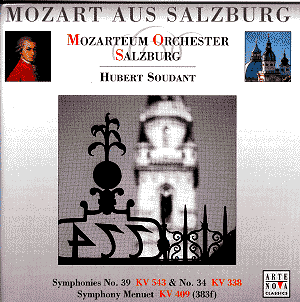Time was that it seemed a little strange that such
an important Mozartian place, geographically, as Salzburg should have
an orchestra that was on a fairly provincial level. Things sound to
be better now and Iíve no complaints in that sense about these scrupulously
prepared and very well played accounts.
The Dutch conductor Hubert Soudant won the Karajan
Conducting Prize in Berlin in 1971 and the Cantelli Competition in Milan
in 1973. Since then he has built up a reputation as a reliable, clear-headed
interpreter of a wide range of music, both in the concert hall and in
the opera house. He has been conductor of the Salzburg Mozarteum Orchestra
since 1994.
Although the instruments are modern ones these performances
are in many ways children of their time, with plenty of detached articulation,
swift speeds (no suggestion that the andantes might really be adagios)
and extremely buoyant, not least in the separate Minuet in C. The booklet
writer quotes Einstein on this Ė "one of the most pompous Mozart
ever wrote". Einstein hadnít heard Soudant conduct it. A lovely
performance.
If thus far Soudant plays by the book, he is interventionist
over dynamics, introducing sudden pianos and steep crescendos/diminuendos
in many places (listen to the hair-pins in the wind parts at the start
of the minuet of no. 39). I didnít feel it to be overdone though I did
wonder if perhaps the apparent spontaneity of these gestures (very carefully
rehearsed actually, I imagine) is lost when they come round exactly
the same in repeats. Both finales get only first-half repeats. Our parentsí
generation maybe heard this music as a little more majestic (at least
as regards no. 39) but perhaps this is how we feel it today, and of
course the likes of Walter and Böhm are available if you prefer
them (or want to have alternatives).
Is Soudant on their level? Not quite, Iíd say. I often
think that it is the capacity of a conductor to crown a performance
with the finale to a symphony which marks him out as "great".
Excellent as Soudantís account of the finale of no. 39 is, I have a
particular fondness for an Intaglio issue, long disappeared, of Boult
conducting the work in Boston. I wouldnít necessarily prefer Boult in
the earlier movements but the finale takes fire and grows with every
repetition (he even gives the second-half repeat, to the consternation
of his audience). Now that is great conducting.
Still, with a bright and clear, but not clinical, recording,
youíre getting two (or three) excellent performances at a very low price.
Newcomers to classical music who learn the music this way will have
every cause for gratitude and even those with deep pockets might wonder
whether there is any point in paying more.
Christopher Howell


